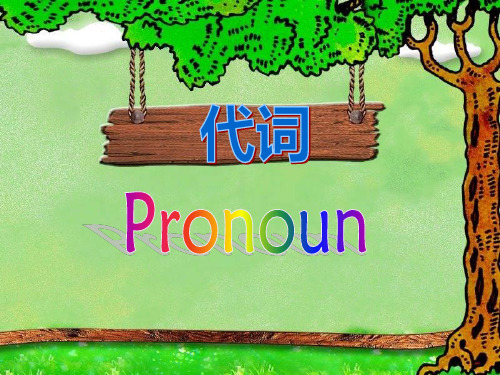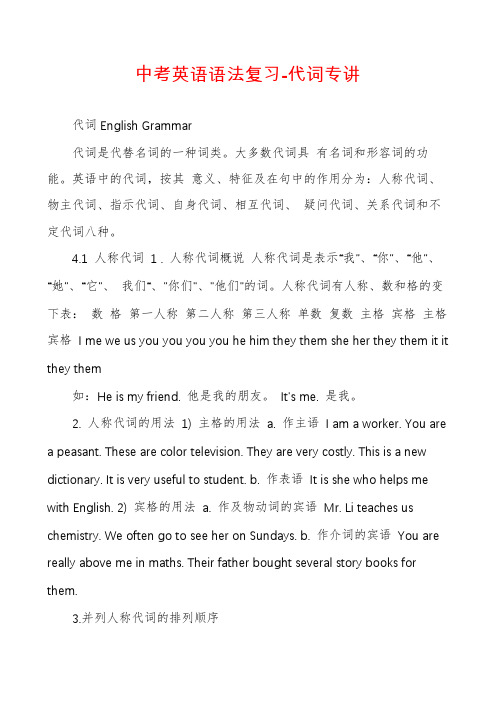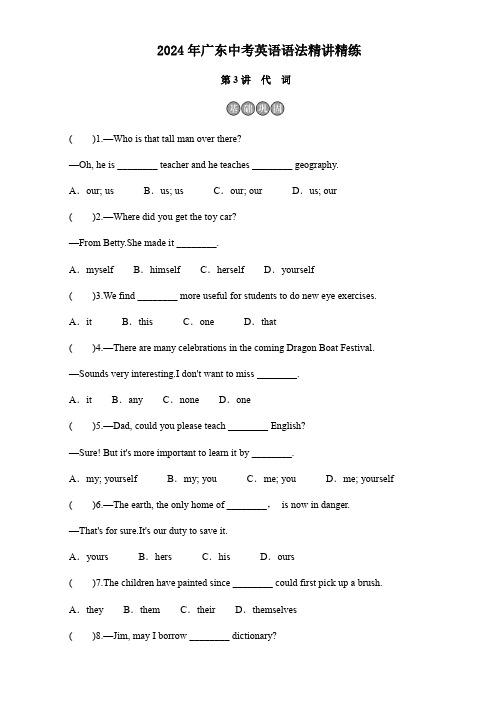《中考语法完全突破记忆大纲》第3讲:代词
中考英语语法全解之代词总结

中考英语语法全解之代词总结代词一、概说代词是取代名词及起名词作用的短语或句子的词。
代词依据其用法特色可分为九类:人称代词、物主代词、反身代词、指示代词、不定代词、相互代词、疑问代词、连结代词和关系代词等。
聚焦考点与汉语不一样,在英语中代词使用特别宽泛。
代词的数目有限,但种类和变化却特别众多。
正确的使用代词能够使文章更为简短、生动、富于变化。
代词是英语试题中观察许多的词类之一,考点在以下几个方面:形容词性物主代词和名词性物主代词的用法比较;人称代词的主格和宾格;不定代词的用法,特别是 some, any,及其所组成的复合不定代词的观察,还有 it 的用法等。
常有的代词分类以下表:分类例词人称代词I , we , you , he , she , it , them物主代词my , your , his , our , their , mine , hers , theirs , ours反身代词myself , yourself , ourselves , itself , themselves指示代词this , that , these , those不定代词all , some , any , much , many , few , little相互代词each other , one another疑问代词who , whom , whose , which , what连结代词who , whom , whose , which , what关系代词who , whom , whose , that , which , as二、人称代词1.人称代词的形式人称代词依据它在句中的功能,有主格与宾语之分:单数复数主格Iyouhesheitweyouthey宾格meyouhimheritusyouthem意思我你他她它我们你们他(她 ,它 )们2.人称代词的用法人称代词在句中能够用作主语(用主格)和宾语(用宾格):He loves her, but she hates him. 他爱她,但她却厌烦他。
备战中考丨第三讲—代词(思维导图微课讲解音频)

备战中考丨第三讲—代词(思维导图微课讲解音频)于玲课堂第三讲——代词,走过路过不要错过,消化完这篇文章分分钟帮你中考涨分数~中考分析代词是代替名词、形容词和数词的词。
中考课标要求掌握人称代词、物主代词、反身代词、指示代词、不定代词和疑问代词。
考查这些代词在句中作主语、宾语、定语及表语的用法。
其中不定代词是高频考点, 人称代词、物主代词和反身代词属于次高频考点,指示代词相对较少。
卷面分值约为4-7分,主要分布在单项选择、完形填空、短文填空和句子翻译中。
导图梳理点击查看可以放大思维导图哟~音频讲解当前浏览器不支持播放音乐或语音,请在微信或其他浏览器中播放 5:45 代词思维导图讲解来自翼课网知识精讲一代词的概念代词是代替名词、形容词和数词的词。
二代词的句法功能1.代词作主语Everyone likes my father because _____is friendly. (2015,陕西)A. hisB. himC. heD. himself2.代词作宾语Miss Smith is very kind. We all like_____ . (2015,北京)A. itB. herC. himD. them3.代词作定语My brother likes painting. It’s one of _____ hobbies. (2015,河北)A. myB. herC. hisD. your4.代词作表语—Excuse me, is this Tom’s new pencil sharpener?—Yes, it’s _____ . He bought it just now. (2014,达州)A. hisB. hersC. yours答案:1.C 2.B 3.C 4.A三代词的分类及区分◆人称代词1.人称代词有人称、数和格之分。
人称代词有主格和宾格,通常主格作主语,宾格作宾语。
2.人称代词还可作表语,作表语时用宾格。
中考英语总复习 专题03 代词(语法专项突破+系统梳理+提升演练)(含解析) 人教新目标版

语法专项突破专题三代词考点一人称代词th ey1(1)形容词性物主代词具有形容词的特性,在句中用作定语,后面必须接名词。
This is my bag.这是我的书包。
(2)名词性物主代词具有名词的特性,后面不能再跟名词。
它相当于“形容词性物主代词+名词”。
在句中可作主语、宾语或表语。
—Whose bike is this ?这是谁的自行车?—It's mine.是我的。
(mine=my bike)考点三反身代词反身代词就是代指某人自己,单数以sel f结尾,复数以selves结尾。
考点四不定代词none指示代词有单数形式的this与that和复数形式的these与those。
指示代词的用法主要有以下几点:1.this 和these 指时间或空间较近的人或物,也指下文将要提到的事,还可用来介绍别人;that 和those 指时间或空间较远的人或物,也指刚刚提到过的事。
This is my bike and that is yours.这是我的自行车,那一辆是你的。
Do remember this :Never put off what you can do today till tomorrow. 一定要记住这一点:今日事今日毕。
This is my friend ,Bob.这是我的朋友鲍勃。
2.打电话时用this 介绍自己,用that 询问对方。
T his is Sally speaking.Is that Linda?我是萨莉,你是琳达吗? 3.that 常用于比较结构中,代替前面提到的单数名词或不可数名词;若前面提到的是复数名词,则用those 代替。
The weather in Guangzhou is much warmer than that in Beijing in winter. 冬天广州的天气比北京的暖和得多。
The pears on this tree are bigger than those on that one.这棵树上的梨比那棵树上的大。
《中考语法完全突破记忆大纲》第3讲代词

第三讲:代词一.代词的分类代词是用来代替名词(或名词性结构)的词。
九类:人称代词,物主代词,反身代词,相互代词,指示代词,不定代词,疑问代词,连接代词和关系代词。
(人物反相指,不疑连关词)二.代词详解1. 人称代词(1) 定义:表示“你,我,他/她/它及其复数”的代词称为人称代词。
(2). 用法①作主语(用主格)如: We eat to live; we don’t live to eat.②作宾语(用宾格)如: They gave him some books.③作表语(主格,宾格皆可)如: It must be he.(主格)It was him that I saw yesterday.(宾格)注意:人称代词作主语,其后不带谓语动词时,在口语中常用宾格。
如: —Does anyone know him?—Me.(3) it的用法①主要用于指代上文提到的事物,也可用于指代婴儿或不明身份的人如:---What’s this?---It’s a book.(=This is a book.)I bought a pen last week, but I lost it yesterday.—Who is it?—It’s Tom.②指代天气, 温度, 时间, 距离, 环境等。
如: It’ s cold today.It’s ten o’clock now.③用作形式主语如: It’s important to master English.(it=to master English)④用作形式宾语如:I found it interesting to teach English.(it=to teach English)2.物主代词(1) 定义:(2) 用法①形容词性的物主代词:只用作定语如: I haven’t got your name.②名词性物主代词: 可用作主,宾,表语。
如: Hers is a new bike.I don’t like hers.Victory will be ours.3.反身代词(1)(2) 用法①作宾语如: God help those who help themselves.(自助者,天助之。
中考英语语法复习之代词总结

中考英语语法复习之代词总结语法复习之代词总结代词的分类:人称代词、物主代词、反身代词、指示代词、关系代词、疑问代词、连接代词、不定代词和相互代词等。
1. 人称代词:人称代词代替人或事物的名称,分为主格和宾格两种形式。
<td rowspan="2" style="box-sizing: border-box; border-style: solid; border-color: windowtext; padding: 0px 7px; margin: 0px; max-width: 100%; word-break: break-all; word-wrap: break-word !important;"valign="top" width="41"><td rowspan="2" style="box-sizing: border-box; border-bottom-style: solid; border-color: windowtext windowtext windowtext rgb did you invite to your birthday party(你都邀请了谁参加你的生日聚会的) What does she want to be when she grows up(她长大了想干什么)(2)疑问代词不分单复数,视它所替代的人或事物决定单复数,但是通常用单数;如果修饰名词,则以名词的单复数为准。
Who is (are) in that playhouse(谁在游戏房里)What is that (那是什么)What are those (那些是什么)What colours do they have(它们有哪些颜色)8. 不定代词:代替或修饰不特指的人或事物的代词叫不定代词。
中考英语总复习第2部分语法突破专题3代词精讲课件

A. everything B. nothing
C. anything
D. something
5. (201河3 南)He thinks himself somebody, but we ody
B. anybody
C. somebody
D. everybody
考点 人称代词、物主代词与反(身★代★词☆)
定代词完形填空 / / 39题 / /
河南省近五年中考统计 高频考
考点 题型 2017 2016 2015 2014 2013 点
年份
物主代 词语运用 /
词
/ 71题 /
/ ★☆☆
人称代完形填空41题 /
/
/ / ★☆☆
词 词语运用73题 73题 / 72题 70题 ★★☆
河南省近五年中考统计
考点 题型
英语
2018 河 南
专题三 代词(必考点: 2 ~3分,单选、完形、词语
运用)
录目
CONTE NTS
中考解 读
考点精 讲
试题精 练
中考解
读
河南省近五年中考统计
高频考
考点 题型
2017 2016 2015 2014 2013 点
年份
普通不
单项选择 / /
/
/ / ☆☆☆
定代词
复合不单项选择 / 23题 / 25题 31题 ★★☆
初中常见的复合不定代词:
分类 some-
any-
no-
every-
somebody anybody nobody everybody
(某人) (任何人) (没有人) (每人) 人
someone anyone no one everyone
中考英语语法复习代词讲解(26页)

introduce oneself 自我介绍;be proud of oneself自豪
devote oneself to 全神贯注于;献身于
behave oneself 举止规范; express oneself 表达思想
hurt oneself 弄伤自己; dress oneself (up) 穿衣(打扮)
12
中考英语 语法复 习 代词 讲解( 26页) -PPT执 教课件 【推荐 】
中考英语 语法复 习 代词 讲解( 26页) -PPT执 教课件 【推荐 】
3.反身代词
myself, yourself, herself, himself, itself, ourselves, yourselves, themselves, oneself 1).作动词的 Please help yourself to some fish, Lora. 2).作介词的宾语 She’s very angry with herself for her carelessness. I’m confident of myself= I have confidence in myself. . 3).作表语: I’m not feeling myself today.
Hale Waihona Puke It is fifteen years since he came to Shanghai.
中考英语 语法复 习 代词 讲解( 26页) -PPT执 教课件 【推荐 】
中考英语 语法复 习 代词 讲解( 26页) -PPT执 教课件 【推荐 】
5)在一些惯用结构中作形式主语或形式宾语 It is important for us to learn English well. It is kind/nice of you to help me 。 I find/think it useful to read English every day. It is said that an traffic accident happened to him last night It seemed that his interview was a success.
初中英语中考语法复习代词知识讲解

中考英语语法复习代词知识讲解一、基本概念1) 定义: 代词是一类用来替代名词或相当于名词的词,大多数代词都具有名词和形容词的功能。
2) 在初中阶段,我们所学的代词主要有8 种:人称代词、物主代词、指示代词、不定代词、反身代词、疑问代词、关系代词和相互代词。
3) 人称代词是代替人或事物的代词,有人称、数、格的变化,在句中用作主语的人称代词叫主格;用作宾语的人称代词叫宾格。
4) 物主代词是表示所有关系的代词,分为形容词性物主代词和名词性物主代词。
5) 指示代词是专门用来指出或标示人或物的代词,常用的指示代词有单数的 this 和 that 以及复数的 these 和 those。
6) 不定代词是不指明替代任何特定的名词或形容词的代词,根据所表达的意义,不定代词可以分为两大类,即肯定性不定代词和否定性不定代词。
肯定性不定代词有:both, all, many, much, one, other, each, another, a few, a little, either, some (someone, somebody, something), any (anyone, anybody, anything),every(everyone, everybody, everything) 。
否定性不定代词有: no, neither, none, nobody, nothing。
7) 反身代词又叫自身代词,或用来表示强调,或表示某个动作又反过来作用于施动者本身,有人称和数的变化。
8) 疑问代词表示对某人或某物提问,一般用在特殊疑问句的句首。
在初中阶段,我们所学的疑问代词有 who, whom, whose, what 和 which。
9) 关系代词是一种引述前面已经提过的名词或代词的一类词,它主要有 who, whom, whose, which, that 等,用来引导定语从句,在从句中做主语、宾语、表语、定语、状语等。
中考英语语法复习-代词专讲

中考英语语法复习-代词专讲代词English Grammar代词是代替名词的一种词类。
大多数代词具有名词和形容词的功能。
英语中的代词,按其意义、特征及在句中的作用分为:人称代词、物主代词、指示代词、自身代词、相互代词、疑问代词、关系代词和不定代词八种。
4.1 人称代词1 . 人称代词概说人称代词是表示“我”、“你”、“他”、“她”、“它”、我们“、"你们"、"他们"的词。
人称代词有人称、数和格的变下表:数格第一人称第二人称第三人称单数复数主格宾格主格宾格I me we us you you you you he him they them she her they them it it they them如:He is my friend. 他是我的朋友。
It's me. 是我。
2. 人称代词的用法1) 主格的用法a. 作主语I am a worker. You area peasant. These are color television. They are very costly. This is a new dictionary. It is very useful to student. b. 作表语It is she who helps me with English. 2) 宾格的用法a. 作及物动词的宾语Mr. Li teaches us chemistry. We often go to see her on Sundays. b. 作介词的宾语You are really above me in maths. Their father bought several story books for them.3.并列人称代词的排列顺序1) 单数人称代词并列作主语时,其顺序为:第二人称第三人称第一人称you he/she/it I You, he and I should return on time. 2) 复数人称代词作主语时,其顺序为:第一人称第二人称第三人称we you They 注: 在下列情况中,第一人称放在前面。
2024年广东中考英语语法精讲精练 第3讲 代词

2024年广东中考英语语法精讲精练第3讲代词()1.—Who is that tall man over there?—Oh, he is ________ teacher and he teaches ________ geography.A.our; us B.us; us C.our; our D.us; our()2.—Where did you get the toy car?—From Betty.She made it ________.A.myself B.himself C.herself D.yourself()3.We find ________ more useful for students to do new eye exercises. A.it B.this C.one D.that()4.—There are many celebrations in the coming Dragon Boat Festival.—Sounds very interesting.I don't want to miss ________.A.it B.any C.none D.one()5.—Dad, could you please teach ________ English?—Sure! But it's more important to learn it by ________.A.my; yourself B.my; you C.me; you D.me; yourself ()6.—The earth, the only home of ________,is now in danger.—That's for sure.It's our duty to save it.A.yours B.hers C.his D.ours()7.The children have painted since ________ could first pick up a brush. A.they B.them C.their D.themselves()8.—Jim, may I borrow ________ dictionary?—Oh, sorry.________ is at home.A.your; Mine B.your; My C.yours; Mine()9.—What club would you like to join, the chess club or the music club?—________.I've already joined the paper cutting club.A.Either B.Neither C.Both D.None()10.—________ do you learn these words by heart?—By using them in different ways.A.When B.How C.Why D.Where一、语法选择When I was five years old, I was far away from my parents.I was just living with my aunt, uncle, grandma and my sister.Most of them said that I was stupid.When I was six years old, I started the grade school.No matter what __1__ estimated (评估) my ability, I knew __2__ I should do.Through my hard work, I got the top 3 at the end of the school year.__3__ was proud of it in my family.And still my parents were away.I hoped that they would be home soon to even just see my achievements.__4__ I had no supports during these days, in the second grade I still kept my grades.I decided to continue the things that made me best.I was not that smart but I had courage __5__ something great.During my high school days I was a bit naughty, so I __6__ to belong to lower section of intelligence in our school.My teacher lost hope and so did my mum.But I proved to them that they were wrong.In the last year of high school, I made my name on the list of the Academic Awardee.Our school has a lot of excellent students, but I studied hard and got __7__ fourth.I'm a college student now.There are still some problems around __8__ give me challenge.But as it has been in the past, I tell __9__,“This is just a TEST OF LIFE.I can get through this.” I have problems and weakness but __10__ doesn't mean I have no right to be better.Life is always a test on how strong we are to live.()1.A.other B.others C.the other()2.A.how B.why C.what()3.A.Someone B.No one C.Anyone()4.A.If B.When C.Though()5.A.do B.doing C.to do()6.A.thought B.am thought C.was thought()7.A.a B.an C.the()8.A.what B.that C.who()9.A.myself B.itself C.ourselves()10.A.it B.one C.this二、短文填空。
讲解03 代词-中考英语总复习基础语法分类讲练(26张PPT)

in ______.
A. my; his
B. his; my
C. me; his
ቤተ መጻሕፍቲ ባይዱ
D. mine; his
( A )③(2020·齐齐哈尔中考) —It’s raining outside. I forgot to bring ______
umbrella.
—I’ve got one. You can use ______.
中考英语总复习•基础语法分类讲练 讲解03 代词
一、人称代词 人称代词不仅指人, 也可以指物, 有人称、数和格的变化。
数 格 第一人称 第二人称
第三人称
单数
主格
宾格
I
me
you
you
he
him
she
her
复数
主格
宾格
we
us
you
you
they
them
they
them
【助记】 人称代词的主格和宾格 人称代词分两格, 分为主格和宾格。 主格句中作主语, 宾语用的是宾格。 句首、动前用主格, 动后介后用宾格。
人称反身代词由形容词性物主代词+self/selves构成, 第三人称反身代词由宾格人 称代词+ self/selves构成。
人称 数
单数
复数
第一人称
myself ourselves
第二人称
yourself yourselves
第三人称
himself, herself, itself themselves
Would you like to join ______?
A. me
B. us
C. you
中考英语总复习(人教版) 语法专项突破课件:专题三 代词

考点四
考点五
考点六
考点七
用法
作主 语
例句
You must be careful when you want to make friends online. 网上交友要当心。
(2)宾格用法
用法 例句
作宾 My sister isn’t able to ride the bike.So I’m going to
no,neither,none,nobody,nothing,few,little
10
考点一
考点二
考点三
基础自主导学
突破核心考点
考点四 考点五 考点六
考点七
2.不定代词的特殊用法 (1)当形容词或else修饰不定代词时,不定代词总是位于修饰词的前面。
There is nothing new in his speech. 他的讲话中没什么新东西。
The pears on this tree are bigger than those on that one. 这棵树上的梨比那棵树上的大。
13
考点一
考点二
考点三
基础自主导学
突破核心考点
考点四 考点五 考点六
考点七
考点六 疑问代词 1.疑问代词的用法
疑问代 用法
词
例句
作主语、表语、宾语(作宾语时在口 Who is the man?
Did she tell you anything else? 她还告诉你别的什么事情了吗? (2)当句子的主语是指人的复合不定代词时,其附加疑问句的主语通 常用代词they来代替;当句子的主语是指物的复合不定代词时,其附加疑 问句的主语通常用代词it来代替。 Everyone is here,aren’t they? 大家都来了,不是吗? Everything begins to grow in spring,doesn’t it? 春天万物复苏,不是吗?
中考基础语法聚焦之代词

中考基础语法聚焦之代词掌握代词的含义以及人称代词、物主代词、反身代词、指示代词、不定代词和疑问代词的基本用法。
(一)中考目标精讲1、熟练掌握人称代词主格和宾格的形式及基本用法。
2、掌握形容词性物主代词和名词性物主代词的形式及基本用法。
人称类别单数复数一二三一二三主格I you he she it We you they宾格me you him her it Us you them形容词性物主代词my your his her its Our your their名词性物主代词mine yours his hers its Ours yours theirs反身代词myself yourself himself herself itself ourselves yourselves themselves3、理解反身代词的基本用法。
例如:She learned French herself. It's hard to do the work all by ourselves.We need help .4.掌握常见不定代词的一般用法。
分类都都不任何(一个)每(一个)另一个涉及两者时both Neither either each the other涉及三者及三者以上时all None any every another不定代词可以代替名词或形容词,并有可数( few,many)与不可数(little,much)的区别。
不定代词没有主格和宾格之分,在句中可作主语、宾语、表语、定语等。
但some,any,no,every等构成的复合不定代词something,anything,nobody,everyone等只能作主语、宾语或表语,不能作定语。
例如Everything goes well!万事如意!注意every,no只能作定语。
例如:①Every child can get a gift .②I have no idea about it。
中考英语总复习 第二篇 语法突破篇 语法专题03 代词课件

用法 指近指 指远指
2021/12/10
第十二页,共三十二页。
2.用法 (1)this, that可用于电话用语中,this指代自己,that则指代对方。 Hello! This is Jane. 喂!我是简。 Is that Mike?你是迈克吗? Who is that?你是谁? (2)it, one, that的用法区别 为了避免重复,可以用it, one, that代替上文出现的名词,具体用法如下: ①it用来指上文提及的同一个事物或前面提及的情况;代替可数名词单数或不可数名词。 She enjoyed the story because it was very interesting. 她喜欢这个故事,因为它很有趣。 The food is delicious. I like it very much.食物很可口,我很喜欢。 ②one用于避免重复可数名词单数。它既可代替事物,泛指同类事物中的一个,也可以代替人;其复数(fùshù)形式为ones,其 所有格形式为one's, 如save one's life 拯救某人的生命; do one's best尽某人的最大努力。
1.分类(fēn lèi) 物主代词是用来表示所有关系的词。物主代词分为形容词性物主代词和名词性物主代词。详见下表:
人称
数
第一人称 第二人称
单数 复数 单数 复数
单数 第三人称
2021/12/10
复数
形容词性 物主代词
my our your your his her its their
名词性物主 代词
城市的人口比镇上的人口多很多。 The apples in the box are different from those on the table. 箱子里的苹果与桌上的苹果不同。
XX初三英语语法专题突破代词(外研)

XX初三英语语法专题突破代词(外研)XX初三英语语法专题突破代词(外研)新的一学期又开始了,亲爱的同学们也将步入紧张而充实的初三最后一学期的生活。
初三是一个神秘的名词,它又是三年学习中终期的一个代名词。
人生的道路虽然很长,但关键的往往却只有几步,而初三就是这关键几步中的第一步。
我们只有迈好这一步,才能顺利通往人生的顶点。
同学们,初三是机遇,初三是挑战,初三这座大山就横在我们面前。
为此,我们只能选择拼搏,不能后退 ! 寒窗九载,只剩最后一搏,同学们,再加一把劲,每天进步一点点,那就是成功,只要不放弃追求,就永远不会被打败。
代词重难点精讲考点精讲命题点一人称代词 1. 人称代词用法口诀人称代词分主、宾,只有八对要区分。
你 ( 们 ) 、它主格、宾格形统一,其余主、宾需分清。
主格用在动词前,宾格放在动词介词后。
2. 物主代词在句中所做成分 (xx 年 37 题考查 ) :形容词性物主代词用来修饰名词,放在名词的前面,相当于一个形容词。
名词性物主代词相当于一个形容词性物主代词加一个名词。
如: This is my( 形容词性物主代词 ) bag. 这是我的包。
Our( 形容词性物主代词 ) school is larger than theirs( 名词性物主代词 ). 我们的学校比他们的大。
物主代词用法口诀物主代词分形、名,形式用法各不同 ; 形容词性先出场:我的 my你的 your; 男的 his 女的 her, 它的 its 不加撇 ; 我们的 our 他们的their 。
物主代词形变名,多数词尾加“ s”; my 变 mine 须分明, his 和 its 是本身 ; 形跟名词,名不跟,用法牢记应分清。
3. 反身代词固定搭配虽然反身代词在安徽近五年单项填空中并未涉及,但是考生很有必要掌握反身代词的常见搭配。
helponeself(to) 自用( 食物等 ) enjoy oneself 玩得愉快dress oneself 自己穿衣服 hurt oneself 伤害自己 teach oneself 自学 lose oneself 失去自我 by oneself 单独地,独自地命题点二普通不定代词 some 一些 ( 肯定 ) any 一些( 否定 ) each( 两者或两者以上 ) 每个,各自的 every( 三者或三者以上中 ) 每个都 both 两者都 all 三者及三者以上都either( 两者)任一的 neither 两者都不 no one 没有人 ( 只能指人,后不能接 of 短语)none(xx 年 34 题考查 ) 无人,无物( 可指人或物,后可接 of 短语) few 几乎没有 ( 否定 )little 几乎没有 ( 否定 ) many 许多 ( 修饰可数名词 ) much 许多 ( 修饰不可数名词 ) other 其他 another 另一个,再一个不指明所代替的名词,而起到名词或形容词作用的代词叫不定代词。
- 1、下载文档前请自行甄别文档内容的完整性,平台不提供额外的编辑、内容补充、找答案等附加服务。
- 2、"仅部分预览"的文档,不可在线预览部分如存在完整性等问题,可反馈申请退款(可完整预览的文档不适用该条件!)。
- 3、如文档侵犯您的权益,请联系客服反馈,我们会尽快为您处理(人工客服工作时间:9:00-18:30)。
第三讲:代词一.代词的分类代词是用来代替名词(或名词性结构)的词。
九类:人称代词,物主代词,反身代词,相互代词,指示代词,不定代词,疑问代词,连接代词和关系代词。
(人物反相指,不疑连关词)二.代词详解1. 人称代词(1) 定义:表示“你,我,他/她/它及其复数”的代词称为人称代词。
(2). 用法①作主语(用主格)如: We eat to live; we don’t live to eat.②作宾语(用宾格)如: They gave him some books.③作表语(主格,宾格皆可)如: It must be he.(主格)It was him that I saw yesterday.(宾格)注意:人称代词作主语,其后不带谓语动词时,在口语中常用宾格。
如: —Does anyone know him?—Me.(3) it的用法①主要用于指代上文提到的事物,也可用于指代婴儿或不明身份的人如:---What’s this?---It’s a book.(=This is a book.)I bought a pen last week, but I lost it yesterday.—Who is it?—It’s Tom.②指代天气, 温度, 时间, 距离, 环境等。
如: It’ s cold today.It’s ten o’clock now.③用作形式主语如: It’s important to master English.(it=to master English)④用作形式宾语如:I found it interesting to teach English.(it=to teach English)2.物主代词(1) 定义:(2) 用法①形容词性的物主代词:只用作定语如: I haven’t got your name.②名词性物主代词: 可用作主,宾,表语。
如: Hers is a new bike.I don’t like hers.Victory will be ours.3.反身代词(1)(2) 用法①作宾语如: God help those who help themselves.(自助者,天助之。
)You should be proud of yourself.②作表语如: The master of your fate is yourself.(命运的主人是你自己。
)I’m not myself today.(我今天不舒服。
)③同位语如:The matter itself is not important.You should ask Tom himself.④作主语单独的反身代词不用作主语,但在“A and/or/nor B”结构作主语时,B可以用反身代词。
如: James and myself did it.4.相互代词(1) 定义: 表示相互关系的代词称为相互代词。
只有两个:each other和one another。
它们都表示“彼此”.(2) 用法each other用于两者及以上之间one another用于三者及以上之间如: We should help each other/one another.5.指示代词(1) 定义:用于指明一定的人或事物时所用的代词称为指示代词。
指示代词:this(这个),that(那个),these(这些),those(那些)this,that指代单数或不可数名词these/those指代可数名词复数this/these指时空上近的事物that/those指时空上较远的事物(2)用法①形容词性用法-作定语如: This desk is small and that one is big.②名词性用法-主要用作主,宾语.如: This is Bill.Do you like that?注意:that可在句中代替前面出现过的单数可数或不可数名词,以避免重复。
如:The climate of Qingdao is cooler than that of Beijing. (that=climate)当其所代替的名词为复数时用those。
如:The apples in the basket are bigger than those on the floor.6. 不定代词1) 定义:不指明代替任何特定名词的代词。
常见不定代词有:all ,both, every, each, either, neither, more, little, few, much, many, another, other, some, any , one, no,something, anything, everything, nothing , somebody, anybody, everybody, nobody, someone, anyone, everyone, no one, none等。
2) 用法要点:(1)every/each①. every只能作定语,后接单数可数名词,指代三者或三者以上的人或事物中的每一个。
如: Every student is present.(每个学生都在场。
)Every man has his weak side.(每个人都有弱点。
)②each指代两者或两者以上的人或事物中的每一个,可以在句中作主语,宾语,定语,同位语。
如:Each of the students will get a book.(主语)I gave a piece of cake to each of the children.(宾语)He had a pen in each hand. (定语)They each have a book. (同位语)(2)some, any二者都可以用作主语,宾语或定语。
可以代替或修饰可数名词(单复数均可)或不可数名词。
①some一般用于肯定句中。
其修饰可数名词复数或不可数名词时,表示“一些”,修饰可数名词单数时表示“某个”,用于数字前时则可表示“大约”。
some用于疑问句时,则表示希望得到对方肯定回答的请求或建议。
如:Some have gone back home.(主语)We like some of them.(宾语)I have some books.(定语)May I have some water? (表请求)Should we get some oil? (表建议)②any多用于疑问句、否定句和条件句中,也可用于肯定句,表示“任何;任一”。
如:Have you any brother/brothers?I don’t like any of these books.我不喜欢这些书。
Take any book(s) you like.试比较: I don’t like some of these books. 这些书中有些我不喜欢。
(3)either, neither代替或修饰可数名词单数形式。
在句中用作定语,主语,宾语,表语。
either指“(两个人或物中的)任何一个”,表肯定意义。
neither则表示“(两个人或物中的)任何一个也不”,为否定意义。
这两个词作主语时,谓语动词需用单数。
如:Does either of you know where I can buy such a pen?(主语)There is tea or coffee—you can have either.(宾语)He sat in the back of the car with a policeman on either side. (定语)他坐在车子后面,一边坐着一个警察。
Both players have been warned, but neither of them takes it seriously. (主语)两个运动员都受到了警告,但是他们都不把它当回事。
I like neither of them.(宾语)Neither parent cares what happens to the child.(定语)(4)many/muchmany代替或修饰可数名词复数,much则代替或修饰不可数名词。
在句中用作定语,主语,宾语,表语。
如: Many want to join us.(主语)We are many, and they are few.(表语)Much has been said on it. (主语)He didn’t say much about it.(宾语)There was too much work for one person(定语)(5) little/a little, few/ a few①little/a little代替或修饰不可数名词; few/a few代替或修饰可数名词。
都可用作定语,主语,宾语,表语。
②little/few表示否定意义,意为“几乎没有”;a little/a few意为“有一点/有几个”,表示肯定意义,说明虽然不多但是有。
如:A little is enough.(主语)We just need a little.(宾语)There is only a little milk. (定语)注意:only,just,quite与a few、a little为固定搭配。
I have many interesting books, and here are just a few.There are only a few people.She has cooked quite a few dinners over the years. (相当多的)(6)a lot (of), lots (of)修饰或代替复数可数名词或不可数名词。
作主语,宾语,表语。
如:A lot has been said on this.(主语)I’ve learned a lot from him.(宾语)That’s a lot.(表语)注意:a lot/lots不可直接置于名词前,其后接名词时,必须用a lot of/lots of。
如:A lot of work has been done.There were lots of people at the party.(7) one / other两者都可指代或修饰人或物,在句中作主语,宾语,表语,定语。
①one代指单数可数名词,其复数形式为ones。
如:One can do what one likes here.(主语)--Have you got a camera?--No.--Oh, you should buy one.(宾语)They are all old ones.(表语)②other可指代或修饰单数或复数可数名词;the other用于指代单数名词,表示“(两者中的)另一个”。
